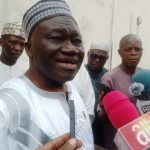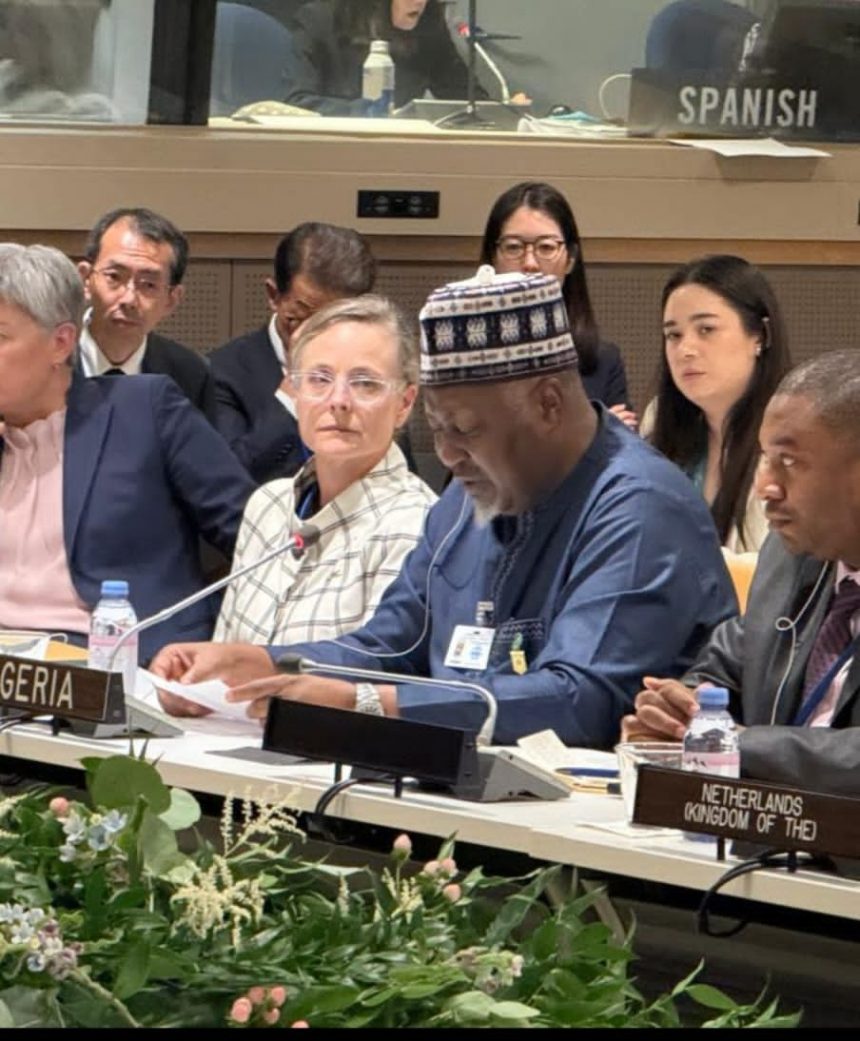Nigeria Steps Forward as Global Voice for Nuclear Disarmament.
By Bala Salihu Dawakin Kudu Democracy Newsline Newspaper
September 25, 2025 – New York, United States
In a moment charged with urgency and moral clarity, Nigeria’s Minister of Defence, Hon. Mohammed Abubakar Badaru, CON, mni, delivered a powerful call for immediate global action to end the production of fissile material — the essential ingredient in nuclear weapons — at the first Ministerial Meeting of the Friends of the Fissile Material Cut-off Treaty (FMCT), hosted by Japan on the sidelines of the 80th United Nations General Assembly.
The Honourable Minister’s speech, delivered against the somber backdrop of the 80th anniversary of the bombings of Hiroshima and Nagasaki, was both a plea and a challenge: a plea for cooperation and a challenge to world powers to live up to their commitments under international disarmament agreements.
> “Closing the fissile material gap is the most realistic way to stop an uncontrolled arms race,” said Badaru. “The FMCT will rebuild trust, strengthen the Non-Proliferation Treaty, and give momentum back to disarmament.”
This wasn’t merely a diplomatic statement; it was a bold assertion of leadership from a country long seen as a stabilizing force on the African continent. With his remarks, Nigeria transitioned from a participant to a global bridge-builder, advocating for universal disarmament and nuclear restraint.
Minister Badaru was quick to emphasize Africa’s long-standing commitment to nuclear peace. Through the Treaty of Pelindaba, Africa declared itself a nuclear-weapon-free zone — a model of regional cooperation that still holds today.
> “Africa has shown that restraint is possible. Nigeria now calls for that same spirit to guide global action,” he said, drawing applause from several attending delegates.
With conflicts escalating globally and trust in multilateralism under strain, Nigeria’s stance offers a refreshing counterpoint. Its moral argument is backed by historical consistency and diplomatic credibility.
To inject urgency into what has become a stagnant conversation, Nigeria proposed three practical measures to accelerate global consensus on the FMCT:
1. A global moratorium on the production of fissile materials for use in nuclear weapons;
2. The dismantling or conversion of existing production facilities into peaceful and civilian uses;
3. Leveraging these interim steps to build the momentum toward a universal, verifiable, and non-discriminatory treaty.
These proposals, though ambitious, struck a chord with many smaller nations who feel left behind in disarmament discussions traditionally dominated by nuclear-armed states.
Linking Disarmament to Development: The Renewed Hope Agenda
Drawing a direct link between nuclear disarmament and Nigeria’s domestic development goals, the Minister aligned the country’s position with President Bola Ahmed Tinubu’s Renewed Hope Agenda — a framework that emphasizes peace, prosperity, and global partnership.
> “Disarmament is not an abstract debate,” said Badaru. “Every step we take to reduce nuclear risks frees resources for health, education, and economic growth.”
Analysts say this alignment underscores a key shift in global diplomacy — the recognition that security is deeply interconnected with socio-economic progress.
Observers at the UN were quick to take note of Nigeria’s speech. Dr. Keiko Yamashita, a senior nuclear policy expert at the Hiroshima Peace Institute, praised Nigeria’s role:
> “Nigeria’s call is exactly what the disarmament community needs — a principled voice from the Global South that refuses to be sidelined. The FMCT has been on the table for decades, and it’s time to move beyond rhetoric.”
Even representatives from nuclear-armed nations acknowledged the practicality of Nigeria’s proposals, though some stopped short of endorsing a moratorium.
As global tensions simmer and old Cold War dynamics resurface, Nigeria’s leadership may mark a turning point in international disarmament talks. Its positioning — as both a regional peace leader and a global advocate for justice and restraint — is likely to raise its diplomatic profile in years to come.
Whether the FMCT becomes reality may depend on whether other nations match Nigeria’s moral clarity with political courage.
> “The memory of Hiroshima and Nagasaki compels us to act with courage,” Minister Badaru concluded. “The survival of humanity demands it.”
Mati Ali
PA (Media & Publicity) to the Honourable Minister












